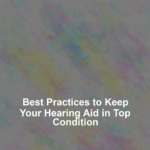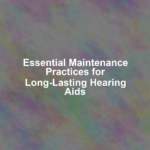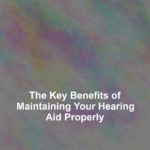Caring for your hearing aid is like tending to a delicate garden; it requires consistent attention and the right techniques to ensure it flourishes. YouG??ve invested in your auditory health, and to protect that investment, you need to employ a set of best practices that will extend the life and performance of your hearing device.
Daily cleaning is essential, using soft, dry cloths to gently remove any earwax or debris that could interfere with functionality. But itG??s not just about what you do daily; how you store your hearing aid when itG??s not in use, and the way you manage moisture can have profound effects on its longevity.
And while youG??re certainly adept at the basics, there might be some nuances and professional tips that could elevate the care you provide to your device. Imagine discovering a simple habit change that could drastically reduce the number of repairs over the lifetime of your hearing aid.
Stay tuned, as we reveal the cornerstone habits that will keep your hearing aid in top-notch condition, and the common pitfalls that even the most diligent users can sometimes overlook.
Daily Cleaning Techniques
To ensure optimal performance, clean your hearing aid each day with a soft, dry cloth. Gently wipe the surface to remove earwax, dust, and skin oils that can accumulate and affect its function. DonG??t apply too much pressure, as the delicate components inside can be damaged.
YouG??ll also want to check the microphone ports and vent openings. Use a wax pick or brush specifically designed for hearing aids to clear away any debris thatG??s gotten lodged in these small spaces. Be careful not to poke too deeply, which could harm the internal parts.
At the end of each day, before you go to bed, open the battery compartment. This not only prolongs battery life by preventing corrosion but also airs out the inside, reducing the chances of moisture build-up. If your hearing aid has a rechargeable battery, ensure itG??s properly seated in its charging station.
Safe Storage Solutions
After cleaning your hearing aid daily, itG??s crucial to store it properly to prevent damage and extend its lifespan. A designated storage case not only shields your device from physical harm but also keeps it free from dust and moisture when youG??re not wearing it. Find a case thatG??s sturdy and secure, yet easy for you to handle.
YouG??ll also want to consider the environment where you store your hearing aid. Keep it in a cool, dry place, away from direct sunlight or heat sources that could warp its delicate components. Humidity can be a hearing aidG??s enemy, so if you live in a moist climate or are storing it overnight, a dehumidifier container could be a wise investment.
Moisture Management
Ensuring your hearing aid remains moisture-free is essential for optimal performance and longevity. Moisture can damage the internal components, leading to costly repairs or replacements. YouG??ve got to be proactive in managing moisture, especially if you live in humid environments or lead an active lifestyle.
Firstly, make it a habit to wipe your hearing aid with a dry, soft cloth after each use. If youG??ve been sweating or exposed to rain, pay extra attention to drying your device. At night, store your hearing aid in a dehumidifier specifically designed for these devices. These dehumidifiers not only dry out any moisture but also sanitize your hearing aids.
Be wary of extreme temperatures, as condensation can form when moving between cold and warm environments. To minimize this, keep your hearing aid in its case until it gradually reaches room temperature. Additionally, avoid wearing your hearing aid during activities that could expose it to water, like showering or swimming.
Invest in protective covers or sweatbands if youG??re frequently outdoors or exercising. These can shield your hearing aids from moisture without affecting their functionality. Remember, consistent care and moisture management can greatly extend the life and effectiveness of your hearing aids.
Regular Performance Checks
While keeping your hearing aid dry is crucial, itG??s just as important to regularly check its performance to catch any potential issues early. YouG??ve likely invested a lot in your hearing aid, and you want it to work at its best for as long as possible. To ensure this, youG??ll need to adopt a routine of performance checks.
Start by listening for any changes in sound quality. If your hearing aid sounds muffled or distorted, itG??s a sign that somethingG??s not right. DonG??t ignore these little hiccups; they can indicate a need for professional servicing or a simple fix you can do at home, such as changing the wax filter or batteries.
Next, regularly test the volume controls and program settings to make sure theyG??re responding correctly. If theyG??re not, you might be missing out on optimal hearing experiences. Remember, small issues can escalate if left unchecked.
Professional Service Schedule
To keep your hearing aid in top condition, itG??s essential to adhere to a regular schedule of professional servicing. Much like youG??d service your car, your hearing aid requires consistent check-ups to ensure it functions correctly.
HereG??s what you need to know about setting up a routine with your audiologist or hearing aid specialist:
-
Within the first month of use to fine-tune settings
-
Assessment of comfort and fit
-
Regular Check-Ups
-
Every 3 to 6 months for cleaning and software updates
-
Evaluations to adjust to any changes in hearing
-
Comprehensive testing to assess hearing aid performance
-
Discussion about new features or potential upgrades
Conclusion
YouG??ve got the know-how to keep your hearing aid in top shape now. Remember to gently clean it daily, store it safely when not in use, and keep moisture at bay.
Conduct regular checks to ensure itG??s working as it should. And donG??t skip those professional check-upsG??theyG??re crucial.
Stick to this routine, and your device will stay reliable, helping you catch every word of lifeG??s conversations.










